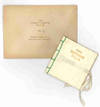
Great Issues in American History: Vol 2 1864-1957
by Hofstadter, Richard (Editor)
- Used
- Paperback
- Condition
- Good+ condition - cover wear, former owner's name on first page/None
- Seller
-
Coeur d'Alene, Idaho, United States
Payment Methods Accepted
About This Item
Great Issues in American History Vol 2 1864-1957by Richard Hofstadter (Editor)A Vintage Book #: K-688Fifth printing 1960Paperback4.2 x 7.3 inches, 460 pages
Richard Hofstadter (August 6, 1916 – October 24, 1970) was an American historian and public intellectual of the mid-20th century.
Hofstadter was the DeWitt Clinton Professor of American History at Columbia University. Rejecting his earlier communist approach to history, in the 1950s he came closer to the concept of "consensus history", and was epitomized by some of his admirers as the "iconic historian of postwar liberal consensus." Others see in his work an early critique of the one-dimensional society, as Hofstadter was equally critical of socialist and capitalist models of society, and bemoaned the "consensus" within the society as "bounded by the horizons of property and entrepreneurship", criticizing the "hegemonic liberal capitalist culture running throughout the course of American history".
His most widely read works are Social Darwinism in American Thought, 1860–1915 (1944); The American Political Tradition (1948); The Age of Reform (1955); Anti-intellectualism in American Life (1963), and the essays collected in The Paranoid Style in American Politics (1964).
He was twice awarded the Pulitzer Prize, first in 1956 for The Age of Reform, an analysis of the populism movement in the 1890s and the progressive movement of the early 20th century; and then in 1964 for the cultural history Anti-intellectualism in American Life.
In 1946 Hofstadter joined the Columbia University faculty and in 1959 succeeded Allan Nevins as the DeWitt Clinton Professor of American History, where he played a major role in directing Ph.D. dissertations in the field. According to David Brown, his biographer, after 1945 Hofstadter philosophically "broke" with Charles A. Beard and moved to the right, becoming leader of the "consensus historians," a term that Hofstadter disapproved of, but it was widely applied to his apparent rejection of the Beardian idea that the fundamental conflict running throughout American history that pitted economic classes against each other was the sole basis for understanding history.
In a dissenting view, Christopher Lasch wrote that unlike the "consensus historians" of the 1950s, Hofstadter saw the consensus of classes on behalf of business interests not as a strength but "as a form of intellectual bankruptcy and as a reflection, moreover, not of a healthy sense of the practical but of the domination of American political thought by popular mythologies."
As early as his American Political Tradition (1948), but still viewing politics from a critical left-wing perspective, Hofstadter rejected black-and-white polarization between pro-business and anti-business politicians. Making explicit reference to Jefferson, Jackson, Lincoln, Cleveland, Bryan, Wilson, and Hoover, Hofstadter made a statement on the consensus in the American political tradition, which is sometimes seen as "ironic".
The fierceness of the political struggles has often been misleading: for the range of vision embraced by the primary contestants in the major parties has always been bounded by the horizons of property and enterprise. However much at odds on specific issues, the major political traditions have shared a belief in the rights of property, the philosophy of economic individualism, the value of competition; they have accepted the economic virtues of capitalist culture as necessary qualities of man.
Hofstadter later complained that this remark in a hastily written preface requested by the editor had been the reason for "lumping him" unfairly into the category of "consensus historians" like Boorstin, who celebrated this kind of ideological consensus as an achievement, whereas Hofstadter deplored it. Hofstadter himself expressed his dislike of the term consensus historian several times. He also criticized Boorstin for overusing the consensus and ignoring the essential conflicts in history.
Richard Hofstadter (August 6, 1916 – October 24, 1970) was an American historian and public intellectual of the mid-20th century.
Hofstadter was the DeWitt Clinton Professor of American History at Columbia University. Rejecting his earlier communist approach to history, in the 1950s he came closer to the concept of "consensus history", and was epitomized by some of his admirers as the "iconic historian of postwar liberal consensus." Others see in his work an early critique of the one-dimensional society, as Hofstadter was equally critical of socialist and capitalist models of society, and bemoaned the "consensus" within the society as "bounded by the horizons of property and entrepreneurship", criticizing the "hegemonic liberal capitalist culture running throughout the course of American history".
His most widely read works are Social Darwinism in American Thought, 1860–1915 (1944); The American Political Tradition (1948); The Age of Reform (1955); Anti-intellectualism in American Life (1963), and the essays collected in The Paranoid Style in American Politics (1964).
He was twice awarded the Pulitzer Prize, first in 1956 for The Age of Reform, an analysis of the populism movement in the 1890s and the progressive movement of the early 20th century; and then in 1964 for the cultural history Anti-intellectualism in American Life.
In 1946 Hofstadter joined the Columbia University faculty and in 1959 succeeded Allan Nevins as the DeWitt Clinton Professor of American History, where he played a major role in directing Ph.D. dissertations in the field. According to David Brown, his biographer, after 1945 Hofstadter philosophically "broke" with Charles A. Beard and moved to the right, becoming leader of the "consensus historians," a term that Hofstadter disapproved of, but it was widely applied to his apparent rejection of the Beardian idea that the fundamental conflict running throughout American history that pitted economic classes against each other was the sole basis for understanding history.
In a dissenting view, Christopher Lasch wrote that unlike the "consensus historians" of the 1950s, Hofstadter saw the consensus of classes on behalf of business interests not as a strength but "as a form of intellectual bankruptcy and as a reflection, moreover, not of a healthy sense of the practical but of the domination of American political thought by popular mythologies."
As early as his American Political Tradition (1948), but still viewing politics from a critical left-wing perspective, Hofstadter rejected black-and-white polarization between pro-business and anti-business politicians. Making explicit reference to Jefferson, Jackson, Lincoln, Cleveland, Bryan, Wilson, and Hoover, Hofstadter made a statement on the consensus in the American political tradition, which is sometimes seen as "ironic".
The fierceness of the political struggles has often been misleading: for the range of vision embraced by the primary contestants in the major parties has always been bounded by the horizons of property and enterprise. However much at odds on specific issues, the major political traditions have shared a belief in the rights of property, the philosophy of economic individualism, the value of competition; they have accepted the economic virtues of capitalist culture as necessary qualities of man.
Hofstadter later complained that this remark in a hastily written preface requested by the editor had been the reason for "lumping him" unfairly into the category of "consensus historians" like Boorstin, who celebrated this kind of ideological consensus as an achievement, whereas Hofstadter deplored it. Hofstadter himself expressed his dislike of the term consensus historian several times. He also criticized Boorstin for overusing the consensus and ignoring the essential conflicts in history.
Reviews
(Log in or Create an Account first!)
Details
- Bookseller
- Worldwide Collectibles
(US)
- Bookseller's Inventory #
- 1001202005
- Title
- Great Issues in American History
- Author
- Hofstadter, Richard (Editor)
- Book Condition
- Used - Good+ condition - cover wear, former owner's name on first page
- Jacket Condition
- None
- Quantity Available
- 1
- Edition
- Fifth printing
- Binding
- Paperback
- Publisher
- Vintage
- Date Published
- 1960
- Weight
- 0.00 lbs
- Keywords
- History
- Size
- 4.2 x 7.3 inches, 460 pages
Terms of Sale
Worldwide Collectibles
Payments are expected within 10 days unless prior arrangements are made.
About the Seller
Worldwide Collectibles
Biblio member since 2001
Coeur d'Alene, Idaho
About Worldwide Collectibles
Our specialties are unusual books, unusual CDs, and sports memorabilia



